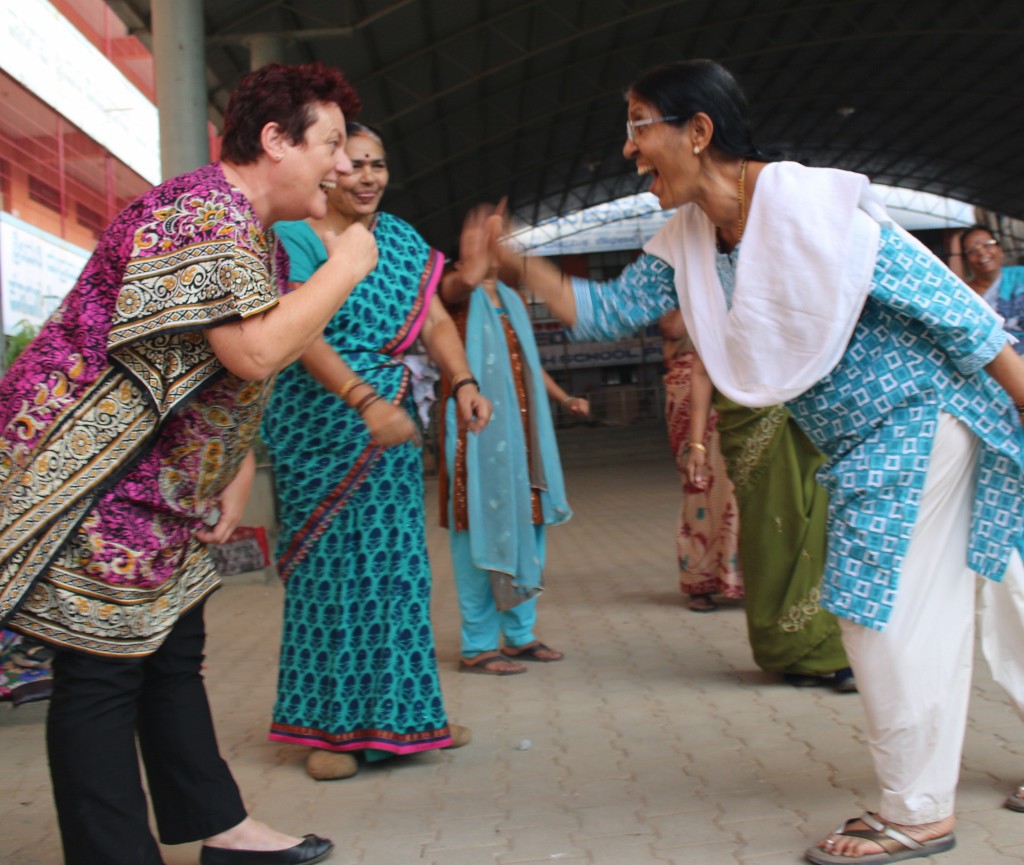
Research shows laughter yoga inoculates against stress
You’ve heard that ‘laughter is good medicine’. Indeed, University of Maryland cardiologist Dr Michael Miller ‘prescribes’ 15 minutes of daily laughter for good heart health.
Now a study indicates one hour of laughter yoga exercises practised in a group once a month can, to use researcher Anna Hatchard’s term, ‘inoculate’, against stress!
The findings, published in the European Journal of Applied Positive Psychology just weeks ago, show that a monthly ‘dose’ of laughter yoga can have profound and lasting positive psychological impacts.
Hatchard, a long-time allied health professional, says there’s compelling support for the social prescription of laughter yoga clubs as a positive psychology intervention and stress management tool.
“Laughter club helped participants change their perspective and equipped them to better cope with the ups and downs of life,” Hatchard told me in our online discussion from her London home.
Participants were also more aware of their overall health and made changes to reflect healthier living.
“The impact of one hour once a month shouted loud and clear how powerful a resource laughter yoga is.”
Health benefits of laughter yoga
Regular laughter yoga exercise has many benefits including:
- stronger immune system
- better breathing
- improved blood pressure
- better mood
- pain management
- better sleep.
Previous evidence-based research has focused on specific target groups, looking at the impact of laughter yoga for people with cancer or kidney disease, dementia, diabetes, or depression, for example.
In this most recent study, Anna Hatchard Master’s research sought to measure laughter yoga’s impact as a health-giving community resource for the general public.
What is a laughter club?
Laughter yoga is a joyous playful raucous exercise regimen, developed by Indian physician Dr Madan Kataria in 1996. Practised in more than 110 countries, laughter yoga has spread through grassroot establishment of volunteer-run social neighbourhood laugher yoga classes, called ‘laughter clubs’.
In India particularly (pre-COVID), laughter club participants gathered daily outside for their laughter exercise session. In Australia, social laughter clubs usually meet once a week—in a park or meeting room— whereas in the UK, laughter clubs often gathered just once a month for one hour of laughter exercises.
Many online laughter yoga sessions are also offered in the wake of COVID-19’s impact worldwide.
How laughter club impacts participants
Hatchard has worked as a neurological physiotherapist for more than 30 years, helping patients with neurological disability caused by stroke, Parkinson’s disease, multiple sclerosis, or spinal cord injuries. She also now runs the UK-based Laughter Lab, providing tailored programs, using laughter, to boost wellbeing, manage stress and create healthier workplaces.
Hatchard’s Master’s thesis entailed in-depth interviews with participants of a monthly laughter yoga club in southern England.
Participants, interviewed in mid-2019, ranged in age from 30s to 70s and had, on average, attended the same monthly laughter yoga club for 3.6 years.
“The positive individual experience for these people was enormous,” she said.
- Laughter yoga lifted mood, well beyond the session. One participant’s perceived effect on mood was “almost like having a month-long glass of wine”!
- Laughter yoga enabled participants to let go of anxieties and worries.
- Laughter yoga enhanced self-confidence and suspended self-consciousness.
The monthly laughter club model X factor revealed
Now, I’m an Australian laughter yoga practitioner who has advocated weekly laughter yoga classes (as well as daily personal practice) for wellbeing. How could 60 minutes out of potential 43,000-odd in a month make such a difference?
The out-of-ordinariness creates a special connection, Hatchard explained.
“They valued the support of their ‘laughter friends’ and valued that these people were slightly removed, or distanced, from their everyday friendship group.
“Distance gave them something of a dissociation from their normal lives, a bit of an escape.”
In the laughter club environment, participants were freer to experience how it felt to laugh out loud and be playful, without fear of judgement. They could ‘let go’ and step away from life for a while.
“They could connect with parts of their self that they would not normally show to the world, and in doing that, grow.”
Hatchard’s research also reveals that a monthly laughter yoga class is enough to provide impetus for healthier living.
“Participants volunteered that they had a greater awareness of their health – breathing, walking, fitness – and wanted to manage their health better,” Hatchard told me.
What this means for laughter clubs
Hatchard’s research suggests to me that rather than say ‘a day without laughter is a day wasted’, or ‘seven days without laughter makes one weak’, there’s validity in offering the monthly model for more than ‘a bit of fun’.
Imagine the joy of anticipating ‘an instant vacation’ with people you like every four weeks!
Read the full research paper.
Find out more about Anna Hatchard’s work in the UK’s Laughter Lab, tailoring programs to boost wellbeing, manage stress and reduce workplace bullying.
Laughter clubs require (at least) a certified laughter yoga leader to facilitate sessions. Find out what’s involved in training as a laughter yoga leader.
Founder of The Happydemic and a Global Ambassador for Laughter Yoga International, HeatherJoy Campbell is an Australian-based professional laughter wellbeing facilitator, speaker and trainer using the platform of laughter yoga and positive psychology techniques to spread a happydemic of wellbeing within communities and workplaces.


